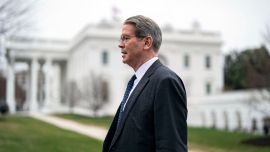The United Nations on Wednesday led calls for a coordinated global effort to vaccinate against Covid-19, warning that gaping inequities in initial efforts put the whole planet at risk.
Foreign ministers met virtually for a first-ever UN Security Council session on vaccinations called by current chair Britain, which said the world had a "moral duty" to act together against the pandemic that has killed more than 2.4 million people.
Secretary-General António Guterres voiced alarm that just 10 nations have administered 75 percent of doses so far – and 130 countries have had none at all.
"The world urgently needs a global vaccination plan to bring together all those with the required power, scientific expertise and production and financial capacities," Guterres said.
He said the Group of 20 major economies was in the best position to set up a taskforce on financing and implementation of global vaccinations and offered full support of the United Nations.
"If the virus is allowed to spread like wildfire in the Global South, it will mutate again and again. New variants could become more transmissible, more deadly and, potentially, threaten the effectiveness of current vaccines and diagnostics," Guterres said.
"This can prolong the pandemic significantly, enabling the virus to come back to plague the Global North."
Henrietta Fore, head of the UN children's agency UNICEF, said: "The only way out of this pandemic for any of us is to ensure vaccinations are available for all of us."
Gaps in efforts
Mexican Foreign Minister Marcelo Ebrard denounced the "injustice" of what he called a "deepening gap" as wealthy countries "monopolise the vaccines."
There is already a plan to help developing nations – Covax is an initiative funded by donors and governments that aims to procure two billion vaccine doses in 2021 with options for a further billion.
Covax will soon be able to start delivery of vaccines after the World Health Organisation approved the shot developed by AstraZeneca, on which the initiative is almost entirely reliant in its first wave.
But aid groups say that many people still risk being left out due to a shortfall in Covax funding to arrange the administration and delicate transportation of vaccines as well as conflicts that make inoculation efforts impossible.
Britain, one of the largest contributors to Covax with a commitment of £548 million (US$760 million), called for temporary ceasefires to allow vaccinations to more than 160 million people it feared were at risk in conflict zones.
"We have a moral duty to act, and a strategic necessity to come together to defeat this virus," Foreign Secretary Dominic Raab said.
In his first Security Council appearance, US Secretary of State Antony Blinken vowed that US President Joe Biden's administration would take a new leadership role after reversing Donald Trump's decision to pull out of the World Health Organisation.
Blinken said the United States would pay up its more than US$200 million in obligations to the UN body by the end of the month and make a "significant" contribution to Covax.
"The United States will work as a partner to address global challenges," Blinken said.
Pressure on China
But Blinken vowed to press for improvements by the WHO, which Trump, under fire for his own handling of the pandemic, accused of being beholden to China and not stopping the deadly virus.
"All countries must make available all data from the earliest days of any outbreak," Blinken said, in a veiled renewal of US criticism that China has not cooperated with a WHO probe into how the virus first emerged in 2019 in Wuhan.
Chinese Foreign Minister Wang Yi warned in his remarks against "attempts to politicise the pandemic" and renewed Beijing's offer of 10 million doses of its homegrown vaccine to Covax.
"We should come together to reject vaccine nationalism," he said.
The Security Council's only direct involvement in the pandemic came in July when, after a tense back-and-forth between the United States and China, it passed a resolution encouraging ceasefires to limit the spread of Covid-19.
One immediate question for the United Nations is whether its own peacekeepers should have priority in vaccination.
India, a leading exporter of vaccines, announced a donation of 200,000 doses for UN peacekeepers.
"The pharmacy of the world is stepping forward to meet the global vaccines challenge," Foreign Minister Subrahmanyam Jaishankar said.
by Philippe Rater & Shaun Tandon, AFP

























Comments